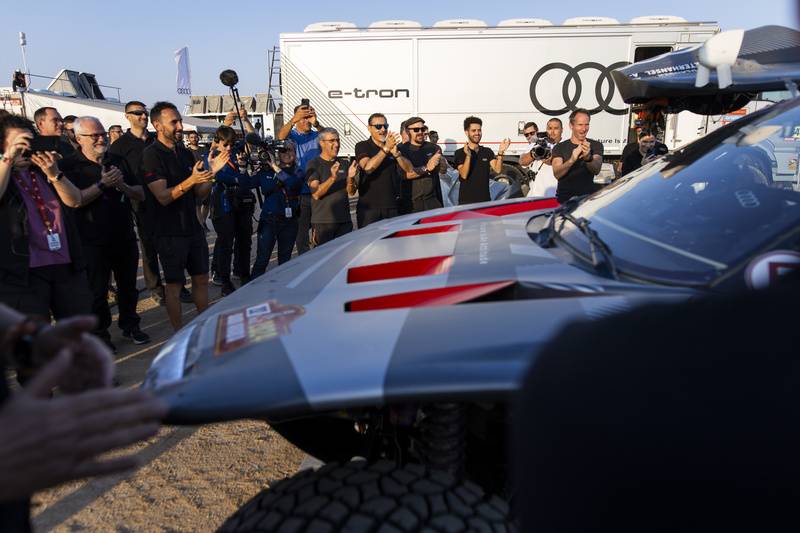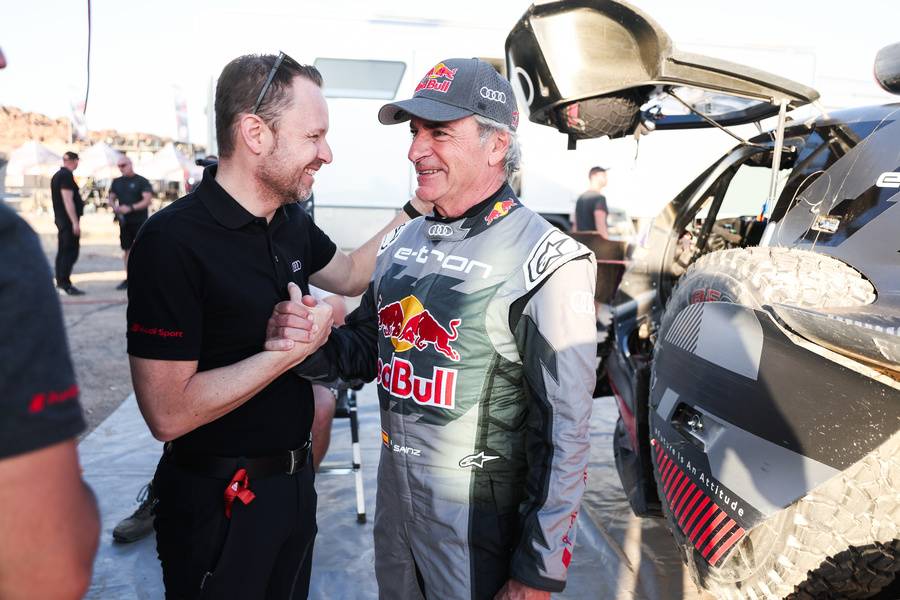Sparking: Audi’s electric Dakar Rally car was driven to victory by Carlos Sainz.
The Dakar Rally is an intense race over 12 days, where drivers pilot their machines through the Saudi Desert, balancing reliability, speed and consistency.
Carlos Sainz dominated this year’s event, which ended on 19 January, in his Audi, bringing home the first win for the brand since entering the race a year ago. It was also the first win for an alternatively powered vehicle.
So what does this mean for the future of Dakar?
Traditionally, due to the simpler nature of internal-combustion engines, they are easier and safer to work on than the innards of electric vehicles (EVs).
Audi seems to have solved this problem by making its electric car extremely reliable, needing only the occasional tyre change and suspension repairs.
Fortunately for the petrol heads out there, these EV rally cars are incredibly advanced — which comes at a high price.
Most teams in the Dakar Rally purchase their vehicles from manufacturers. This explained the high number of Hiluxes parked outside the Toyota Gazoo racing team, which had five cars in the running. Teams such as Overdrive Racing also ran Hiluxes. Now, why hasn’t this happened with the Audis?
The electric Audis are very sophisticated and, for a team to race one as a privateer, they would have to make a massive investment in an array of tools and equipment just to keep the car alive.
This comes at a much greater cost than the traditional servicing equipment a typical Dakar team has.
There is also the element of danger when dealing with electric cars. Rally cars are constantly abused, especially the undercarriage. The batteries are located under the car, which can make repairs dangerous.
The power contained in the batteries can be lethal and this adds to the challenge of competing in an EV.
 Audi’s electric Dakar Rally car was driven to victory by Carlos Sainz.
Audi’s electric Dakar Rally car was driven to victory by Carlos Sainz.
Electrical fires are difficult to extinguish, compounding the danger for drivers and officials.
On the alternative power side of racing, there is a constant push for different fuel sources to keep up with modern emission standards and the call for cleaner racing.
Hydrogen is a fuel that has been researched over the past couple of decades and, although it seems like a good alternative to petrol, its potential to explode under pressure or ignition is an issue.
The fear of rapid combustion aside, there was a team at the 2024 Dakar Rally that took on the challenge of competing in a hydrogen-powered car called the HySE-X1. This funky little off-road racer formed part of Dakar’s Mission 1000.
Mission 1000 is a new concept to Dakar, providing space for manufacturers and teams to test the boundaries in groundbreaking new power-unit developments.
These cars focus on future alternative power sources, such as hydrogen and battery power and biofuels.
Although these project vehicles don’t directly race in Dakar, they do go through the same gruelling conditions as the rest of the competitors.
This makes Audi’s electric car winning by over an hour that much more impressive.
At this point, it is clear that we will see more EVs competing in the car group. However, it is important to consider just what it takes to win the Dakar Rally.
Unlike other racing disciplines, the amount of power the vehicle has doesn’t decide if it will be able to successfully compete for the title.
 Carlos Sainz won the 2024 Dakar Rally
Carlos Sainz won the 2024 Dakar Rally
Navigation plays a massive role in placing fast times and consistency is key. If you can finish in the top five every day, you’ll have a great shot at the title. Another thing to consider is tyre degradation on rough surfaces as punctures have proved to be the Achilles heel of many a driver.
It is exciting to see where racing is going. Formula E is growing every year and now the Dakar is being dominated by electricity.
These developments provide insight into what racing might look like in a few years’ time. It could be powered by hydrogen, electricity or biofuels.
Although we are still far from the total annihilation of petrol power units, it is sad to see racing becoming audibly more dull.
I thought it would take more time to see good results from the electric Audis, but it seems to be more about the driver than the car, and Sainz proved his driving ability once again.
For the lovers of noise and engines, fear not, as internal combustion engines will not be going anywhere just yet as the price of EV racers means they are a less sensible option for private racing teams.
So, for now, we can still enjoy the symphony of exploding petrol in Dakar. But it looks like the era of electrified rally racing is upon us.